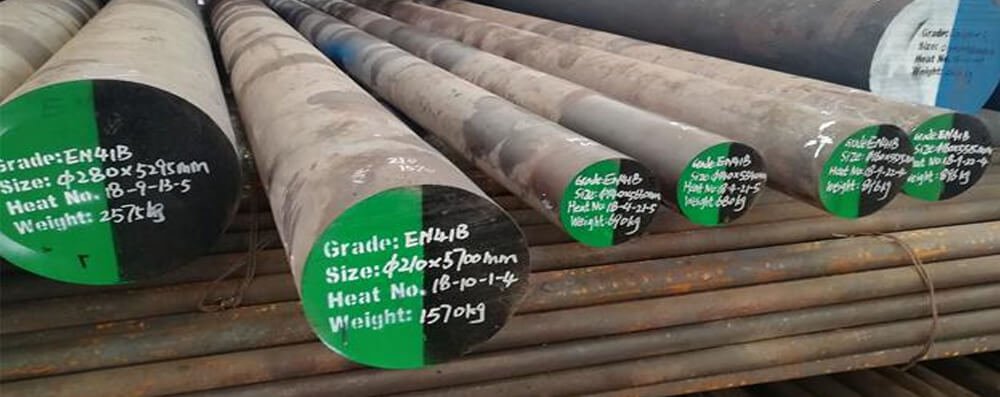Introduction
EN41B is a high-grade nitriding steel known for its exceptional surface hardness, core strength, and wear resistance after nitriding. It belongs to the family of low-alloy steels enriched with chromium, molybdenum, and aluminum, making it ideal for parts requiring high fatigue and abrasion resistance. EN41B is widely utilized in applications demanding a hard, wear-resistant surface and a tough core.
Properties of the Grade:
- Excellent case nitriding ability
- High surface hardness (up to 68–70 HRC after nitriding)
- Good core toughness and strength
- High wear and fatigue resistance
- Good machinability in annealed condition
- Moderate corrosion resistance
- Excellent dimensional stability during nitriding
- Good weldability with proper precautions
Uses/Applications of the Grade:
- Gears and shafts
- Crankshafts
- Spindles
- Camshafts
- Rocker arms
- Valve parts
- Bushings
- Nuts and bolts
- Piston rods
- Automotive and aerospace components
Chemical Composition:
| Element | Content (%) |
| Carbon (C) | 0.36 – 0.44 |
| Silicon (Si) | 0.10 – 0.35 |
| Manganese (Mn) | 0.50 – 0.80 |
| Chromium (Cr) | 0.90 – 1.20 |
| Aluminum (Al) | 0.90 – 1.30 |
| Molybdenum (Mo) | 0.15 – 0.25 |
| Sulfur (S) | ≤ 0.035 |
| Phosphorus (P) | ≤ 0.035 |
Mechanical Properties:
(Typical Values after Nitriding)
| Property | Typical Value |
| Tensile Strength | 850 – 1000 MPa |
| Yield Strength | 550 – 650 MPa |
| Elongation | ≥ 12% |
| Impact Toughness | Good, depending on core hardness |
| Surface Hardness (after Nitriding) | 68 – 70 HRC |
| Core Hardness (before nitriding) | 28 – 34 HRC |
Physical Properties:
| Property | Typical Value |
| Density | 7.85 g/cm³ |
| Modulus of Elasticity | 210 GPa |
| Thermal Conductivity | ~ 45 W/m·K |
| Specific Heat Capacity | ~ 460 J/kg·K |
| Coefficient of Thermal Expansion | ~ 11.7 × 10⁻⁶ /°C |
Forging:
Forging Temperature Range: 850°C – 1150°C
Forging Procedure:
- Preheat uniformly.
- Forge within the range.
- Cool slowly after forging to avoid cracking.
Heat Treatment:
-
Annealing:
- Heat to 650°C – 700°C.
- Cool slowly in the furnace to achieve maximum softness for machining.
-
Hardening:
- Harden at 820°C – 860°C.
- Quench in oil or air, depending on section size.
-
Tempering:
- Temper immediately after hardening at 150°C – 200°C to relieve internal stresses.
-
Nitriding:
- Carried out at 500°C – 530°C.
- Achieves high surface hardness with excellent wear and fatigue resistance.
Critical Temperatures:
- Hot Rolled Bars: As per EN 10060 standards.
- Bright Bars: As per ISO h9/h11 or customer-specified tolerances.
- Ground Bars: Precision up to ISO h6 tolerances available.
Machinability:
- Good machinability in the annealed condition (~60% relative to B1112 steel).
- Post-nitriding, machining is not recommended due to extreme surface hardness.
- Use high-speed steel or carbide tooling with proper cooling/lubrication for best results.
Corrosion Resistance:
- Moderate corrosion resistance.
- Suitable for dry and non-corrosive environments.
- Surface treatments or coatings (such as plating or nitriding) enhance corrosion resistance.
Weldability:
- Weldable with suitable pre-heating and post-heating treatments.
- Preheat to 200°C – 300°C before welding.
- Post-weld stress relief is recommended to maintain mechanical properties.
Available Form:
- Hot Rolled Round Bars
- Bright Drawn Bars
- Peeled and Ground Bars
- Forged Bars
- Custom-cut Lengths
- Annealed or Hardened + Tempered Condition
Conclusion:
EN41B Alloy Steel Bar is an exceptional choice for applications that require high surface hardness combined with a tough core. Its excellent nitriding properties and strong mechanical performance make it an ideal material for demanding industrial and automotive components. With proper heat treatment, EN41B offers outstanding wear resistance, fatigue strength, and dimensional stability, ensuring long service life even under the most challenging operating conditions.
Related Products : 16MnCr5, EN19, 42CrMo4, 20MnCr5, EN353, EN31, EN24, EN47, EN41B, SAE4140, SAE52100, SAE 8620, SCM420, EN36C, Maps


